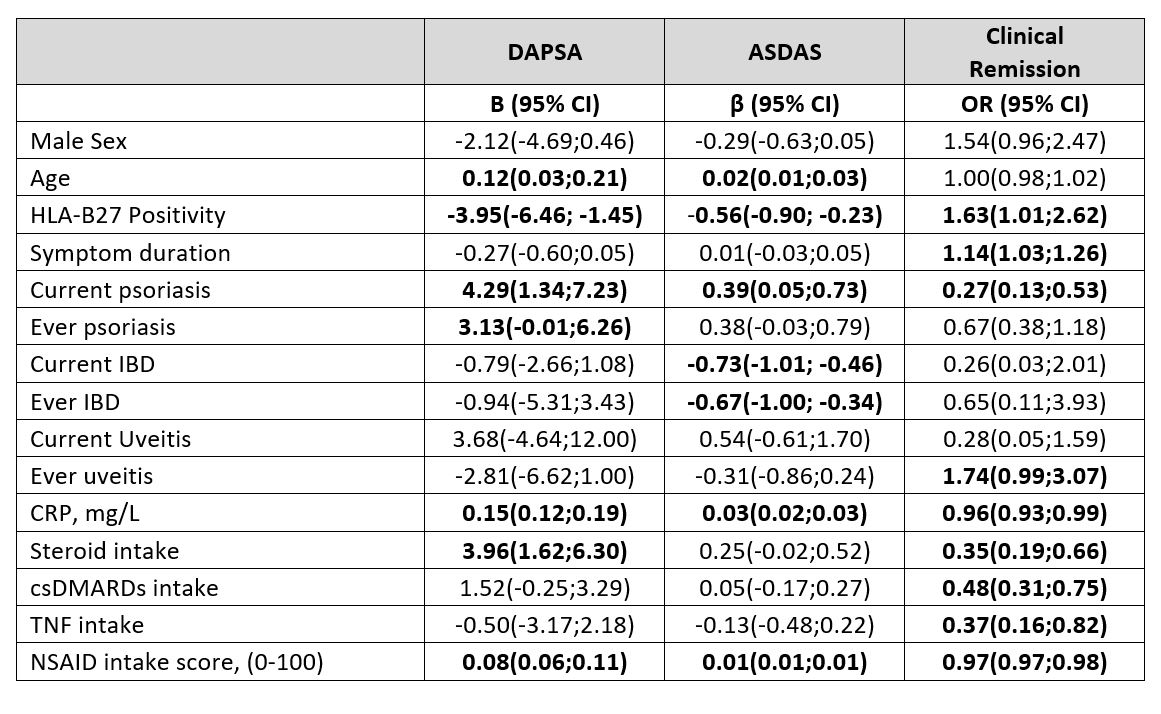Session Information
Session Type: Poster Session C
Session Time: 9:00AM-11:00AM
Background/Purpose: Depending on leading manifestation, Spondyloarthritis (SpA) is classified as axial (axSpA) or peripheral SpA (pSpA). Achieving of remission/inactive disease is key goal in treatment of SpA, including pSpA. Results from recent worldwide ASAS PerSpA study showed that nearly 10% of SpA patients were identified as having pSpA (as opposed to other forms of SpA) by rheumatologist, but there are still no long-term observational studies focusing on outcomes including disease activity/remission in pSpA. The aim of this study is to investigate factors associated with disease activity and achievement of remission over a period of up to 10 years of clinical observation in early pSpA patients.
Methods: Data from patients diagnosed with pSpA in GESPIC (with predominant peripheral manifestations, symptom duration of up to 5 years and not classified as axSpA) according to rheumatologist were used for this study. Visits were scheduled every 6 months for 2 years, then annually up to year 10. Clinical characteristics, examination (arthritis, enthesitis), and activity (questionnaires and laboratory) were collected at visits. Association between parameters and disease activity/remission [defined by Disease Activity in Psoriatic Arthritis (DAPSA), Axial SpA Disease Activity Score (ASDAS), and clinical remission (complete absence of arthritis or enthesitis)], was analysed by generalized estimating equations (GEE).
Results: The mean age of 115 pSpA patients (51.3% male) was 37.3 ± 12.2 years, and 71 (61.7%) patients were HLA-B27 positive. Baseline DAPSA and ASDAS were 13.3 ± 8.1 and 2.4 ± 0.9. During follow up 48 (41.7%), 46 (41.7%), and 94 (81.9%) patients reached at least once DAPSA remission (DAPSA < 4), ASDAS-Inactive disease (ASDAS< 1.3), and clinical remission, respectively. In univariable analyses, female sex, older age, HLA-B27 negativity, current and history of psoriasis, steroid, csDMARDs and higher NSAID intake were associated with higher DAPSA and lower odds of remission. Similar results were observed regarding ASDAS and clinical remission (Table). Multivariable analyses showed that history of psoriasis, HLA-B27 negativity, steroid intake, and higher NSAID intake were associated with higher DAPSA and ASDAS scores (Fig A,B), while longer symptom duration, psoriasis history, steroid, TNFi and higher NSAID intake, and higher CRP were associated with lower odds of remission (Fig C).
Conclusion: Several parameters associated with higher disease activity and absence of remission were identified. Psoriasis and higher CRP were associated with lower odds of achieving clinical remission, while an association with drug usage is likely a consequence of high disease activity.
To cite this abstract in AMA style:
Torgutalp M, Peng X, Proft F, Rios Rodriguez V, Rademacher J, Protopopov M, Haibel H, Rudwaleit M, Sieper J, Poddubnyy D. Factors Associated with Achieving Remission in Patients with Early Peripheral Spondyloarthritis: 10-Year Results from the German Spondyloarthritis Inception Cohort [abstract]. Arthritis Rheumatol. 2023; 75 (suppl 9). https://acrabstracts.org/abstract/factors-associated-with-achieving-remission-in-patients-with-early-peripheral-spondyloarthritis-10-year-results-from-the-german-spondyloarthritis-inception-cohort/. Accessed .« Back to ACR Convergence 2023
ACR Meeting Abstracts - https://acrabstracts.org/abstract/factors-associated-with-achieving-remission-in-patients-with-early-peripheral-spondyloarthritis-10-year-results-from-the-german-spondyloarthritis-inception-cohort/


